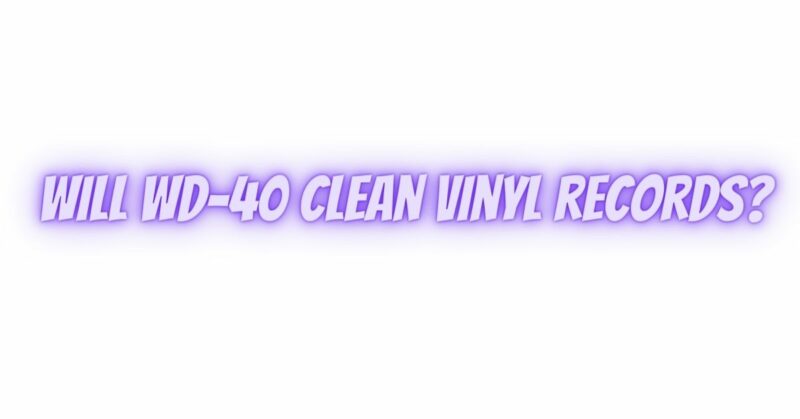Cleaning vinyl records is an essential step in preserving their sound quality and longevity. While there are various commercial record cleaning solutions available, some vinyl enthusiasts have wondered whether household products like WD-40 can be used as a cleaning agent. In this article, we’ll explore whether WD-40 is a suitable choice for cleaning vinyl records and provide recommendations for safe and effective vinyl record cleaning.
The Risks of Using WD-40 on Vinyl Records
WD-40, a popular multi-purpose lubricant and penetrating oil, is not designed for vinyl record cleaning and can pose several risks to your records:
- Chemical Residue: WD-40 leaves behind an oily residue that can attract dust and dirt. This residue can become embedded in the grooves of your records, potentially affecting sound quality.
- Potential Damage: The chemicals in WD-40, including petroleum-based solvents, can interact with the vinyl material and damage it over time. Prolonged exposure may lead to vinyl degradation and distortion of the sound.
- Record Label Damage: WD-40 can cause damage to the paper labels on vinyl records. The oil-based nature of WD-40 can lead to label staining and deterioration.
- Affects the Turntable: WD-40 residue can transfer to your turntable’s stylus (needle) and other components, potentially causing operational issues.
Safe and Effective Vinyl Record Cleaning Alternatives
To properly clean vinyl records and maintain their condition, it’s best to use specialized record cleaning solutions and tools. Here are some recommended alternatives to WD-40 for vinyl record cleaning:
- Record Cleaning Solutions: Invest in a quality record cleaning solution designed specifically for vinyl records. These solutions are formulated to effectively clean records without causing damage or leaving residue. They come in both liquid and spray forms and are readily available from reputable audio equipment suppliers.
- Anti-Static Brush: Use an anti-static brush with soft bristles to remove dust and debris from the surface of your records. This step can help prevent static buildup and minimize dust attraction.
- Carbon Fiber Brush: A carbon fiber brush is excellent for gently cleaning records before and after playback. It helps remove static charge and microscopic particles that can affect sound quality.
- Record Cleaning Machine: For serious vinyl collectors, investing in a record cleaning machine can provide a thorough and efficient cleaning process. These machines use a combination of cleaning fluid and vacuum suction to clean and dry records.
- Microfiber Cloths: Soft, lint-free microfiber cloths can be used for gentle surface cleaning. Ensure the cloth is clean and free of any debris that could scratch the record.
Proper Vinyl Record Cleaning Techniques
When cleaning vinyl records, follow these proper techniques:
- Lay the Record Flat: Always work with the record placed on a clean, flat surface to prevent warping or bending.
- Apply Cleaning Solution: Apply a small amount of the record cleaning solution to the surface of the record, then gently spread it evenly with a brush or cloth.
- Clean in a Circular Motion: When using a brush, clean the record’s surface in a circular motion, following the grooves. Avoid applying excessive pressure.
- Dry Thoroughly: Allow the record to dry completely before playback. Use a separate clean cloth to dry it or let it air dry. Ensure no moisture remains in the grooves.
- Store Properly: Store your records vertically in a cool, dry place and protect them with inner and outer sleeves to prevent dust and damage.
In conclusion, while WD-40 may have its uses around the house, it is not a suitable or recommended choice for cleaning vinyl records. Using proper record cleaning solutions and tools designed for vinyl records will help preserve their condition and ensure the best possible sound quality during playback. Proper care and maintenance are essential for enjoying your vinyl collection for years to come.


